Running tips for beginners: 13 simple PT-approved ways to improve your cardio fitness
Experts share their top tips for running 5km without stopping in as little as six weeks.
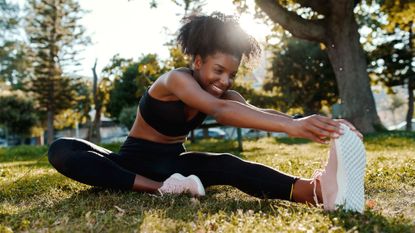

So, you're searching the Internet for running tips - probably because you watched the London Marathon yesterday and are feeling inspired to lace up.
That said, you're not entirely sure how to start running as a beginner or haven't laced up in a while. You're aware of the many benefits of running - you know, improved heart health, cardio fitness, metabolism and so on - but that doesn't change the fact that every time you head out you end up sounding like Wheezy from Toy Story.
Don't worry - you're not alone. Knowing where to start when it comes to how to run for longer can feel overwhelming, especially if you're building your fitness levels up from scratch. At times, it'll likely be pretty unpleasant - but stick with it. Everyone has to start somewhere, and with the right training plan and dedication, research shows that you should be able to manage a comfortable 5km without stopping in six to nine weeks.
Do check out our guides to strength training for running, while you're here, and if you're keen to commit to a challenge this year, our training tips for a marathon might help.
Once you've got your base level of fitness nailed, check out our expert explainer on how to run faster, too.
Running tips for beginners: 13 to make your hobby long term
1. Have the desire
"One of the most important elements, when you start to run, is your reason," says personal trainer Matt Roberts, who has worked with everyone from The Saturdays, to Ellie Goulding, to Naomi Campbell.
Why are you motivated to put on your shoes and pound the pavement? Is it to complete a 10k, get fit, lose weight or just get some time away from the stress of everyday life?
Marie Claire Newsletter
Celebrity news, beauty, fashion advice, and fascinating features, delivered straight to your inbox!
Everyone’s reason will be different, but the more you dig deep and find your why, the easier it'll be to keep your exercise motivation up.
2. Stick to your plan
You don't need to have the best technique in the world, next level fitness or a certain body type to be a runner - far from it.
"Anyone can run, but it does help if you're committed," says Roberts. "Set yourself a realistic goal of how many times you plan to run and stick to it. Remember to not put too much pressure on yourself at the start either. After all, running is meant to be enjoyed."
3. Invest in the right kit
Our health editor's guides to the best running trainers, best sports bras, and best gym leggings can help with that one.
"You don’t need that much kit to be a runner, but the one item I suggest you don’t compromise on is footwear. If you're running a fair amount, then get trainers that are fit to correctly support the way you run. A well-fitting pair of shoes will prevent injury and be more comfortable over longer distances," says Roberts.
4. Start slowly
Okay, so you’ve followed the advice so far - got your reason, blocked out the time and bought some shiny new running shoes - yet you can barely make it to the end of the road without having to stop to catch your breath.
The trick? Start slowly. "Set out for ten minutes and break it down into a run, walk, run cycle until your time is up. Go home, have a stretch and a bath, and enjoy the feeling of completing your first run," advises the PT.
Once that becomes easier, try to run for 15, 20, and 30 minutes, gradually building up your time on feet, he recommends. In need of a little extra help along the way? Our round ups of the best fitness apps is worth a scroll, as programmes, like the NHS approved Couch to 5km, have plans designed specifically for this kind of progress.
5. Get some help
"If you want to take your running more seriously, then it's definitely worth seeking professional advice," recommends Roberts.
Why not try the following?
- Join a running club - in London, we love We Are Runners, Your Friendly Runners, WMN RUN and Rep Runners, but there are thousands.
- Download one of the best running apps - again, there are too many to choose from, but the Nike Training Club app provides in-ear coaching for your runs, for free.
- Download a generic training plan - Runner's World has loads of different ones based on your aim and they're all free.
- Onboard with a run coach - this is the best option if you want your training personalised to you. Our favourites are PASSA, Purdue Performance and Andy Hobdell.
The good thing about running becoming so popular is that there are options for literally everybody now, whether you're elite or just starting out. "Learning techniques from the experts is the easiest way to improve your performance and help you complete longer distances," shares Roberts. "A good training plan cannot be underestimated. Your body needs to be prepared correctly, and time spent in the gym weight training will also make a huge difference to your ability to perform," he adds.
6. Start small
"Be a minute girl instead of a mile girl," suggests Race for Life's fitness expert Lucy Wyndham-Read.
This simply means that if you’re a beginner, a really good tip is to just build up your training in minutes rather than trying to run miles. Over time, this will add up to improve your fitness enough to be able to hit that mile marker.
7. Unclench your hands
Ever heard this one before?
"A lot of women tend to clench their fists when they run," says Wyndham-Read. If you notice yourself doing this, try and relax - you could unnecessary tension and risk injury. "Unclench your hands and imagine you’re cupping a butterfly, as that takes less energy and stops any neck stress or tension."
8. Relax and find your rhythm
This one's important, but harder to apply at first.
"Apply the two Rs – always relax when you’re running and find your comfortable rhythm," advises the expert.
"If you’re uptight and running too fast, you’re not in a comfortable rhythm. Make sure you keep doing a quick check and think: rhythm, relax, rhythm, relax," says Wyndham-Read.
9. Don't run heels first
Ever wondered why all the pro runners bang on about gait all the time? The way you land when you run is actually really important - especially for injury proofing yourself.
"Avoid striking the pavement with your heels as this can contribute to back and knee pain," advises Fitness First personal trainer Andy Hall. "Landing on your forefoot instead will allow your muscles to catch your weight and reduces the impact on joints."
If you're still not sure what the heck this means, booking in a session at a store like Runner's Need might come in handy. On the treadmills in their sites, they can analyse what time of runner you are, in turn advising on what shoes might be best, too.
10. Watch your stance
Similarly to how you land your strides, your actual strides are key to perfecting your running technique, too.
"Leaping forward and striding too far while you run is inefficient and will drain energy - fast," says Hall. "Instead, make sure you stand tall and lean slightly forward, so when you feel like you're going to fall, step forward just enough to catch yourself. This should be the length of your stride. Less motion also means less wear and tear on the joints."
11. Keep hydrated
You should always be aiming to drink around 1.5 litres of water a day - but it's especially important if you've recently taken up running as you'll lose water sweating.
"Being dehydrated can seriously affect your performance," explains Hall. Did you know? "An intensity of 50 per cent effort when hydrated can feel like 70 or 80 per cent when dehydrated." You were warned.
12. Warm up
We know, we know - you've heard this one before. But even a quick three-minute dynamic stretch - that is, not just standing still and wriggling your ankles around - can make all the difference.
"This can increase performance by up to 17 per cent. Keep your stretching dynamic, keeping away from static stretches as these can make your joints unstable," advises Hall.
Our guide to the best warm up exercises might come in handy here.
13. Cool down
Again, a couple of minutes at the end of your sweat session can make all the difference (not sure where to start? Read our guide to cool down exercises, here).
"This allows your body to gradually work down from the state of high exertion. It also allows your muscles to remove waste products and they will be better prepared for your next training session," explains Hall.
How far should you run as a beginner?
Good question. While it'll vary dependent on your fitness level, the PT's in this piece recommend aiming for a set time rather than the number of miles to start off with. Why? Because everyone's fitness level will vary, and time on feet is more important than an arbitrary mile marker.
Try this: Aim for twenty minutes to begin with and make sure to try a mixture of both running and walking to catch your breath. Do remember to warm up and cool down adequately, too.
Can a beginner run 3 miles a day?
As above, it'll totally depend on your base fitness level. If you regularly cycle to work or do the occasional spin class, you might have quite a good base cardio fitness level, meaning you could, hypothetically speaking, run three miles without prior training.
That said, if you're starting from scratch, the NHS' Couch To 5km app is a great start point and recommends aiming for eight minutes of running (alongside twelve minutes of walking) for your first run. The app is specifically designed to help people who haven't been exercising at all to get active, and promises to have you comfortably completing a 5km without stopping in nine weeks.

Ally Head is Marie Claire UK's Senior Health, Sustainability, and Relationships Editor, nine-time marathoner, and Boston Qualifying runner. Day-to-day, she works across site strategy, features, and e-commerce, reporting on the latest health updates, writing the must-read health and wellness content, and rounding up the genuinely sustainable and squat-proof gym leggings worth *adding to basket*. She's won a BSME for her sustainability work, regularly hosts panels and presents for events like the Sustainability Awards, and saw nine million total impressions on the January 2023 Wellness Issue she oversaw. Follow Ally on Instagram for more or get in touch.
-
 Zendaya's reaction to awkward kissing question during Challengers interview has gone viral
Zendaya's reaction to awkward kissing question during Challengers interview has gone viral'Uncomfortable' doesn't begin to cover it
By Iris Goldsztajn
-
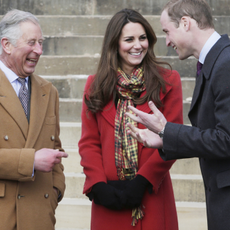 Prince William feels 'immense responsibility' amid Kate and Charles cancer diagnoses
Prince William feels 'immense responsibility' amid Kate and Charles cancer diagnosesHe has a lot on his plate
By Iris Goldsztajn
-
 Taylor Swift just teased a 'timetable' for her new album release
Taylor Swift just teased a 'timetable' for her new album releaseThe wait is torture
By Iris Goldsztajn
-
 After testing dozens of designs—these are the best air fryers money can buy, according to team Marie Claire UK
After testing dozens of designs—these are the best air fryers money can buy, according to team Marie Claire UKPlus a nutritionist's expert insights on the popular cooking method
By Grace Lindsay
-
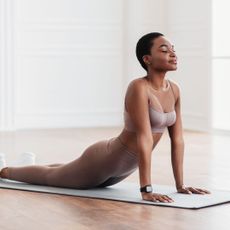 This Pilates ab workout is a combination of all the most effective exercises for a strong body
This Pilates ab workout is a combination of all the most effective exercises for a strong bodyThis one's a good'un.
By Ally Head
-
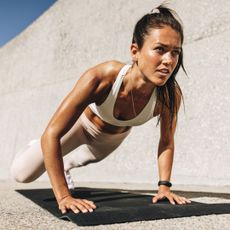 These are the only bodyweight exercises experts reckon are *actually* effective
These are the only bodyweight exercises experts reckon are *actually* effectiveTry from home, the garden, or the gym.
By Ally Head
-
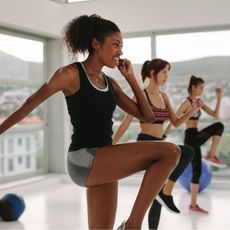 This is the best HIIT workout you can do, according to world-renowned trainer Kayla Itsines
This is the best HIIT workout you can do, according to world-renowned trainer Kayla ItsinesYep, you can do it from home.
By Ally Head
-
 A diabetes drug is going viral for its supposed weight loss benefits—but there’s a seriously dark problem here
A diabetes drug is going viral for its supposed weight loss benefits—but there’s a seriously dark problem hereSearches for weight loss injections have soared by 134%.
By Ally Head
-
 Best cycling shorts: Fitness writers share the only 9 pairs worth your ££
Best cycling shorts: Fitness writers share the only 9 pairs worth your ££Tried and tested.
By Ally Head
-
 Cold water therapy is loved by Lizzo and Harry Styles - here's how it could boost your energy, fitness and more
Cold water therapy is loved by Lizzo and Harry Styles - here's how it could boost your energy, fitness and moreLearn all about why the Wim Hof method could be worth introducing into your day-to-day.
By Ally Head
-
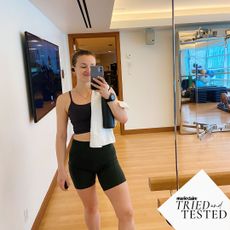 "After a month of trying Reformer Pilates, I was *very* surprised at how much my body changed"
"After a month of trying Reformer Pilates, I was *very* surprised at how much my body changed"If it's good enough for Harry Styles…
By Ally Head